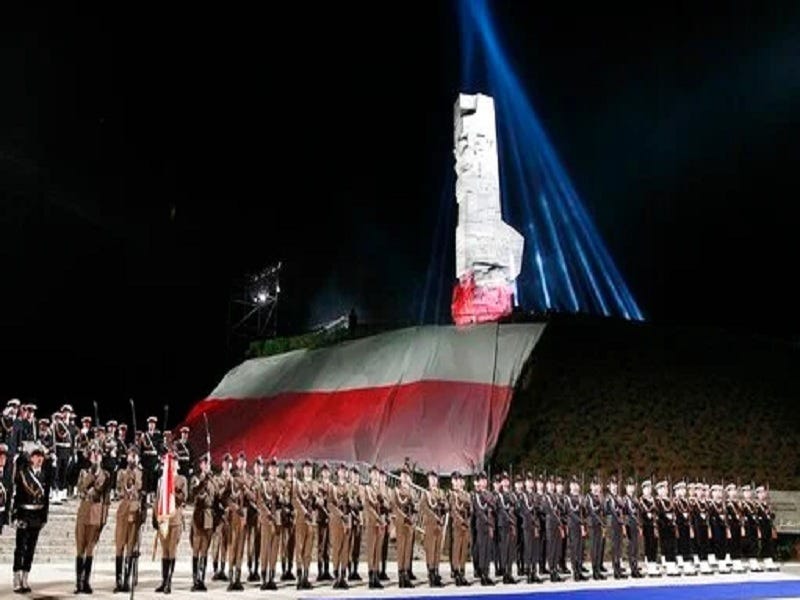This very sensitive issue is about much more than just historical justice like PiS misleadingly presents everything as and is actually motivated by the dual desires to revise one of World War II’s outcomes (or perhaps even some with respect to its eastern border too) in parallel with revising the current EU status quo.
Polish grey cardinal Jaroslaw Kaczynski demanded that Germany pay his country €1.3 trillion in reparations for World War II last week during the 83th anniversary of Nazi Germany’s invasion of his country, which Berlin immediately rejected on the basis that their disputes from that time were settled per a 1953 agreement that also resulted in mutual recognition of their contemporary border. The ruling “Law & Justice” party (PiS per its Polish abbreviation), however, maintains that the Polish People’s Republic only went along with that arrangement under pressure from its Soviet patron. PiS therefore regards it as illegitimate and has thus demanded that Germany pay the requested reparations.
There are significant geopolitical dimensions to this dispute. First, opposition leader Donald Tusk – who’s suspected by many of being a German puppet – does indeed have a point insofar as claiming that the timing of Kaczynski’s demand is to rally support for PiS on an anti-German basis ahead of the fall 2023 elections. After all, it was none other than the grey cardinal himself who dramatically declared at the start of the year that Germany is building a “Fourth Reich”. His government’s Foreign Minister recently warned about their Western neighbor’s imperialist proclivities too, though the indefinite disruption of Nord Stream I on Friday might complicate Berlin’s speculative plans.
The second point to be made is that German reparations to Holocaust survivors and most recently its former imperial colony of Namibia show that the EU’s de facto leader isn’t against this policy in principle. This observation raises the question of why it’s not willing to reopen the issue with Poland. Berlin’s stance is that it inherited the former East Germany’s relevant agreement from 1953, which must thus be respected in the interests of international legal consistency. Nevertheless, there’s also no denying that the Polish People’s Republic wasn’t truly independent in terms of its foreign policy, so each side has their respective points that reach back into the Old Cold War’s early history.
Third, it can be argued that Germany already gave Poland generous reparations in the form of the territory that Warsaw acquired after World War II as compensation for that which the Soviet Union obtained from the former Second Polish Republic. These lands, which Poland regards as having been part of its first historical polity over a millennium ago but hadn’t controlled for most of the time since, greatly contribute to the Polish economy. Even so, Warsaw’s stance is that it already deserved to reclaim that territory anyhow so it shouldn’t be regarded as a form of reparations, the latter of which it considers as referring to payment for the financial and physical damage inflicted from 1939-1945.
The fourth point is that reopening the issue of German reparations to Poland risks revising one of the eventual outcomes of World War II, which could encourage Warsaw to exploit the precedent that it would have by then established with its western neighbor to replicate the same against its two post-Soviet ones of Belarus and Ukraine. Although Poland has bilateral agreements with both over recognizing their shared frontier, it can’t be discounted that Warsaw could seek to revise them in order to stir up trouble with Minsk (and thus provoke another regional security crisis with Moscow) simultaneously with accelerating the de facto confederation that it agreed to with Kiev in late May.
And lastly, Poland’s reparation demands are intended to generate enormous attention despite their extremely minimal chance of success, thus reaffirming that country’s credentials as the only real challenger to Germany anywhere in the EU. PiS plans to spin these optics for the purpose of positively influencing perceptions related to its rising role in continental affairs among the Central & Eastern European (CEE) countries that comprise its envisaged “sphere of influence” via the “Three Seas Initiative” (3SI). The grand strategic goal is to rally them all behind Warsaw’s efforts to reform the EU so that it returns to respecting state sovereignty more than it presently does under Berlin’s leadership.
Upon reviewing the geopolitics of German reparations to Poland, it becomes apparent that this very sensitive issue is about much more than just historical justice like PiS misleadingly presents everything as and is actually motivated by the dual desires to revise one of World War II’s outcomes (or perhaps even some with respect to its eastern border too) in parallel with revising the current EU status quo. Viewed from this perspective, Poland plans to shake up the European order because its leadership believes that the resultant disorder will create fertile opportunities for facilitating their grand strategic goal of becoming a Great Power, though their risky scheme’s success is still very far from assured.





YEs!
"Reparations" over any historical grievance is cyncial.
Reparations was, originally, forfeiture by the loser to cover the victor's war costs.
Now, it's just a coinfidence racket and not a very good one at that.
The lesson from the YahWhol Jonnies is never apologize for your ancestors unless you intend to apologize forever because that is how long your ancestors will be your ancestors.